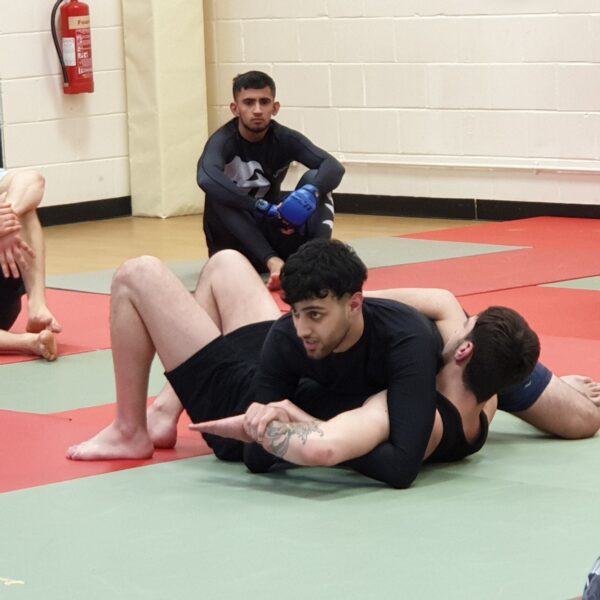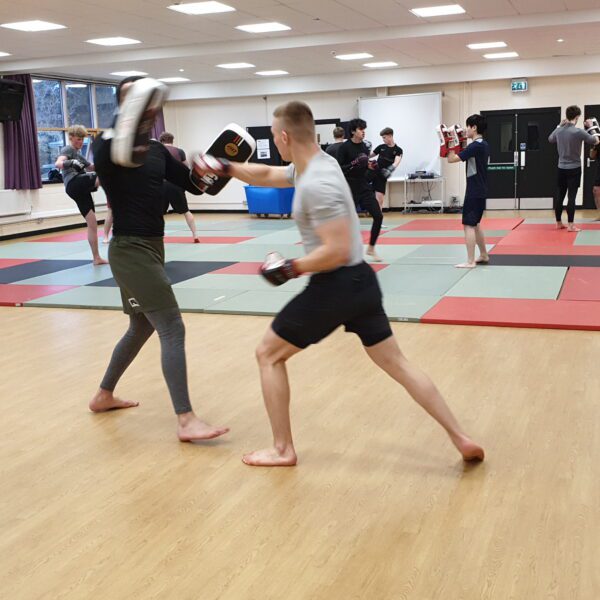Meet the MMA Society

Any assumptions of MMA gyms being violent and toxic are immediately erased when actually entering one, as I found when arriving at the Armitage Sports Centre.
The society is led by the president, Reuben, and coached by Raza and Ethan, who began the session with a few striking drills following a thorough warmup. Having years of experience in MMA, the coaches were fluent in explaining the techniques involved, allowing the members to follow along and start practising with their respective training partners.

After an hour of striking drills, it was time for some groundwork and the coaches began by demonstrating how to perform a kimura submission from side control.
It was evident that all of the members were very supportive of one another and strived to grow together, regardless of where their training partner was in their own personal MMA journey. They exhibited patience and the ability to extract the best out of their fellow trainee throughout the two hours of drills.

During my time with the society, a few of the members were gracious enough to speak about their experiences and how MMA has benefited them. When asking Tom, who had been practising MMA for one year, what the most rewarding aspect of training was, he said, “The social aspect is a big part. You form really strong bonds with the people you train with. The people you meet here are some of the nicest and most disciplined people you’ll ever meet.”
The proof was in the pudding as when I was talking to Tom, it was just before the session had begun, and whilst people were walking into the studio, there were a series of mid-interview handshakes between them. The bond that Tom spoke of was on display for the duration of the session and translated into the trust the members had in each other when training together.

When speaking to Matt, who had a background in kickboxing, he discussed some of the ways in which MMA training had helped him from a physical standpoint.
“When I started off, I was quite skinny and underweight for my height.” Given his strong stature at present, it was obvious to me that consistent training had helped him build a larger physique. He added that it had also given him the motivation to go to the gym more regularly to aid with his MMA.
As a result of his experience, he was able to provide great advice for beginners, saying, “Most people who get into MMA, it’s because of enjoyment and passion. Continue having fun and see where it takes you.”

Sam, a swimmer who had been competing in county championships prior to trying MMA, gave an insight into how regardless of your athletic background, there’s always something you can take with you when transitioning to combat sports.
“There is a skill of being able to push yourself. You think when you start, you’re a lot better at it than you are, but when you see someone in the gym or playing rugby, who’s been doing it for five years compared to one, they’re a lot better at pushing themselves to success. So even if it’s an irrelevant sport, you always gain skills that’ll have some crossover.”
For those beginning their MMA journey, he had the following to say, “You can learn something from everybody, but you can’t learn everything from anybody. Just try and get help from a variety of advanced people in MMA.”
Practising MMA not only develops you inside of the gym, but also outside of it. A level of discipline and control will become cemented within you that is difficult to attain elsewhere and will benefit you in the other aspects of your life. Since training is a challenging endeavour, by completing a session, you can progress through the rest of your week with the acknowledgement that you have bettered yourself in some regard. As a result, anything else you may have to face in your day-to-day life may feel less daunting than usual.
This aspect was illustrated to me by one of the coaches, Raza, who had been boxing since the age of eight before starting Jiu Jitsu at 13 and finally striving to complete his skillset by starting MMA at 17.
“You have to be quite motivated when doing MMA, you need to be committed to going to classes, which translates into different parts of your life. Whether its studying or anything else in your life.”
He also went on to highlight how training has allowed him to feel much safer when outside, “When you’re walking around the city of Manchester, you’re a lot more confident going about your day, knowing that you operate safely. That confidence is an issue for various people, probably females in particular, who are more prone to different situations like catcalling and harassment.”

Knowing how to defend yourself is always a valuable asset when living in a city, but even better is the ability to avoid violence, which is reinforced when training in combat sports as you will become aware of how dangerous fighting can be, especially on the streets where there are no regulations.
Niki, a long time Jiu Jitsu practitioner who recently transitioned to MMA, elaborated on this further, “You don’t go out looking for fights because you fight here and so you’re not trying to prove anything to anyone, and when training, you’re really just doing it for yourself.”
This humility earned from training could be what prevents you from endangering yourself in unnecessary situations. Yet, it is always helpful to be prepared if things do go awry. After all, “it is far better to be a warrior tending his garden rather than a gardener at war.”
A lot of the members mentioned that they would be interested in participating in competitions in the future. And some were already preparing to do so, such as Tom, who was going to be fighting at a competition hosted by the University of Birmingham on the 18 of March. It’s worth keeping an eye on these students as if the stars are aligned and they will it, a bright future in MMA could be on the horizon.
Currently, MMA is not listed as a sport under BUCS, who are the governing body of higher education sports in the UK, which means that it is the responsibility of the societies at different universities to organise events. Reuben, the president, detailed some of the challenges that have to be faced as a result, saying how a lot of communication is required between universities so that events don’t clash, but also that a lot of additional factors need to be taken into account, such as organising ambulances for the fight nights. There is also the issue of funding for travelling expenses and the events themselves.
Despite this, he is hoping to have a fight night organised in Manchester at some point in the next academic year. Hopefully, BUCS will eventually recognise MMA as a legitimate sport, allowing for more opportunities for students to compete. The more support MMA societies at universities can garner, the quicker this can happen.
Whilst Reuben and I were discussing the current landscape of the UFC roster, Max, a dedicated member of the society, kindly invited me to the watch party for UFC 286 that they were going to be hosting at the Turing Tap. The society hopes to draw more student eyes to MMA by continuing such events in the future whenever the fights are on at convenient times, i.e. not at 3am!
Whilst the UoM MMA society should be admired for their dedication and camaraderie, it is the cornerstone of respect upon which they have built themselves that makes them worthy of praise. And therefore, they are a team that deserves to continue to grow with support from students.
Find out more about the society here.







